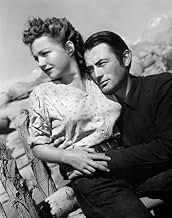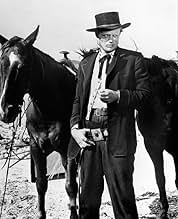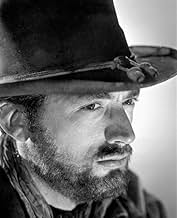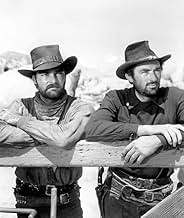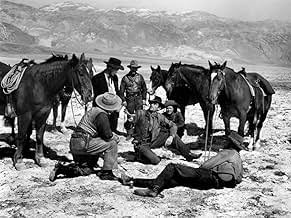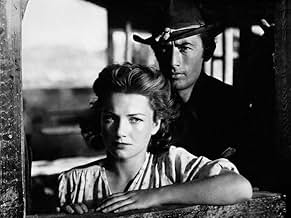VALUTAZIONE IMDb
7,4/10
6205
LA TUA VALUTAZIONE
Aggiungi una trama nella tua linguaA pistol-packing tomboy and her grandfather discover a band of bank robbing bandits taking refuge in the neighboring ghost town.A pistol-packing tomboy and her grandfather discover a band of bank robbing bandits taking refuge in the neighboring ghost town.A pistol-packing tomboy and her grandfather discover a band of bank robbing bandits taking refuge in the neighboring ghost town.
- Regia
- Sceneggiatura
- Star
- Premi
- 5 vittorie totali
Harry Morgan
- Half Pint
- (as Henry Morgan)
Carlos Acosta
- Indian
- (non citato nei titoli originali)
Robert Adler
- Jed
- (non citato nei titoli originali)
Ray Beltram
- Indian
- (non citato nei titoli originali)
Harry Carter
- Cavalry Lieutenant
- (non citato nei titoli originali)
William Gould
- Banker
- (non citato nei titoli originali)
Eula Guy
- Woman Bank Customer
- (non citato nei titoli originali)
Paul Hurst
- Drunk
- (non citato nei titoli originali)
Victor Kilian
- Bartender
- (non citato nei titoli originali)
Norman Leavitt
- Bank Teller
- (non citato nei titoli originali)
Jay Silverheels
- Indian
- (non citato nei titoli originali)
Recensioni in evidenza
The plot of "Yellow Sky" may not be the most original but the performances more than make up for it. A gang of bank robbers cross a dangerous desert only to find themselves in a ghost town. But there are two inhabitants in the ruins; a young woman and her prospecting grandfather. The gang members immediately suspect that the two are hiding gold in their dilapidated mine and set out to rob them. The leader of the gang, however, (a young Gregory Peck) falls in love with the young woman (Anne Baxter) and a showdown is inevitable with the rest of the outlaws. Richard Widmark, in fine form as "Dude" a gambler/murderer with his trademark smirk intact, is Peck's main rival in the gang. The Black and White photography is excellent and the exteriors, filmed in Death Valley, give the movie a much-needed sense of realism. Director William Wellman received outstanding performances from this cast and the movie is considered a minor classic by most film historians. They don't make 'em like this anymore---but they should.
This fine, moody Western was one of a handful of efforts – heralded, incidentally, by the same director’s THE OX-BOW INCIDENT (1943) – which elevated the form and led the genre into its most popular (and prolific) era.
Superbly shot in crisp black-and-white by Joe MacDonald, the film makes the most of its stark location (Death Valley) and terse plot – following a robbery, a band of outlaws eludes the pursuing posse by crossing the desert and finally hitting the titular ghost town (where the only inhabitants are a grizzled prospector and his tomboyish, gun-toting half-breed niece). The cast is headed by relatively new stars of the era – Gregory Peck (in only his second Western), Anne Baxter (she had just won a Supporting Oscar for THE RAZOR’S EDGE [1946]) and Richard Widmark (this was his first of many genre outings, having only debuted a year previously) – which allowed an agreeably fresh and remarkably mature outlook on familiar themes (a small group of people fighting the elements, and themselves over lust and greed).
Though Widmark is surprisingly off-screen for long periods of time (and, consequently, tends to be overshadowed by his co-stars), this still emerges as perhaps the most satisfying among the Westerns he appeared in. For the record, he would play variations on his role here in both GARDEN OF EVIL (1954) and THE LAW AND JAKE WADE (1958); incidentally, I have two more Westerns of his lined up for this week – the former among them (see below) – as part of my tribute to the recently deceased actor. With YELLOW SKY, Peck followed his roguish turn in DUEL IN THE SUN (1946): the character is eventually revealed to be an upstanding person – an intrinsic part of the star’s on-screen persona, which he could play against effectively but did so only occasionally – forced into a life of crime by circumstances. Naturally, the gang subsequently turns on Peck for not wanting to keep all the gold to themselves – and he holes himself up in Baxter and her grandfather’s house, under siege from his former companions! Baxter, then, has been raised in a tough environment where she can practically overcome any obstacle despite her young age and sex: in fact, even more than the outlaws’ intrusion on the life she knew and the property that was rightfully hers, Baxter fears her personal reaction to them (finding herself especially drawn to Peck, who arouses her dormant feminine instincts!).
The film was adapted by Lamar Trotti (who also produced) from a novel by W.R. Burnett, an author more usually associated with gangster/noir pictures and, in fact, as can also be seen from the colorful character names here – Stretch (Peck), Dude (Widmark), Lengthy (dastardly John Russell), Half-Pint (diminutive Henry Morgan), the youthful Bull-Run, the cheerfully heavy-set Walrus, etc. – the narrative could very easily be tailored to that particular milieu. That said, when it was actually remade – in 1967 under the title THE JACKALS, and atypically featuring horror icon Vincent Price in the role of the prospector (by the way, I’ll be watching this version presently since I came across it as a rental) – it retained the Western ambiance, albeit with a difference (which I’ll discuss in that film’s own review).
At the end of the day, I’d say that YELLOW SKY is pretty much essential fare (beautifully handled by the practiced and versatile Wellman – highlighted by a three-way shoot-out which audaciously takes place in a darkened bar-room, and off-screen to boot!). Even so, the film seems to me to be relatively undervalued within the pantheon of the genre itself: for instance, it doesn’t rate as highly as Peck’s three most prestigious Western titles (the afore-mentioned “super production” DUEL IN THE SUN – elaborate, garish but overpowering, the no less grandiose and star-studded THE BIG COUNTRY [1958], and the intimate but psychologically-dense THE GUNFIGHTER [1950] – of which a second viewing is truly in order!).
Superbly shot in crisp black-and-white by Joe MacDonald, the film makes the most of its stark location (Death Valley) and terse plot – following a robbery, a band of outlaws eludes the pursuing posse by crossing the desert and finally hitting the titular ghost town (where the only inhabitants are a grizzled prospector and his tomboyish, gun-toting half-breed niece). The cast is headed by relatively new stars of the era – Gregory Peck (in only his second Western), Anne Baxter (she had just won a Supporting Oscar for THE RAZOR’S EDGE [1946]) and Richard Widmark (this was his first of many genre outings, having only debuted a year previously) – which allowed an agreeably fresh and remarkably mature outlook on familiar themes (a small group of people fighting the elements, and themselves over lust and greed).
Though Widmark is surprisingly off-screen for long periods of time (and, consequently, tends to be overshadowed by his co-stars), this still emerges as perhaps the most satisfying among the Westerns he appeared in. For the record, he would play variations on his role here in both GARDEN OF EVIL (1954) and THE LAW AND JAKE WADE (1958); incidentally, I have two more Westerns of his lined up for this week – the former among them (see below) – as part of my tribute to the recently deceased actor. With YELLOW SKY, Peck followed his roguish turn in DUEL IN THE SUN (1946): the character is eventually revealed to be an upstanding person – an intrinsic part of the star’s on-screen persona, which he could play against effectively but did so only occasionally – forced into a life of crime by circumstances. Naturally, the gang subsequently turns on Peck for not wanting to keep all the gold to themselves – and he holes himself up in Baxter and her grandfather’s house, under siege from his former companions! Baxter, then, has been raised in a tough environment where she can practically overcome any obstacle despite her young age and sex: in fact, even more than the outlaws’ intrusion on the life she knew and the property that was rightfully hers, Baxter fears her personal reaction to them (finding herself especially drawn to Peck, who arouses her dormant feminine instincts!).
The film was adapted by Lamar Trotti (who also produced) from a novel by W.R. Burnett, an author more usually associated with gangster/noir pictures and, in fact, as can also be seen from the colorful character names here – Stretch (Peck), Dude (Widmark), Lengthy (dastardly John Russell), Half-Pint (diminutive Henry Morgan), the youthful Bull-Run, the cheerfully heavy-set Walrus, etc. – the narrative could very easily be tailored to that particular milieu. That said, when it was actually remade – in 1967 under the title THE JACKALS, and atypically featuring horror icon Vincent Price in the role of the prospector (by the way, I’ll be watching this version presently since I came across it as a rental) – it retained the Western ambiance, albeit with a difference (which I’ll discuss in that film’s own review).
At the end of the day, I’d say that YELLOW SKY is pretty much essential fare (beautifully handled by the practiced and versatile Wellman – highlighted by a three-way shoot-out which audaciously takes place in a darkened bar-room, and off-screen to boot!). Even so, the film seems to me to be relatively undervalued within the pantheon of the genre itself: for instance, it doesn’t rate as highly as Peck’s three most prestigious Western titles (the afore-mentioned “super production” DUEL IN THE SUN – elaborate, garish but overpowering, the no less grandiose and star-studded THE BIG COUNTRY [1958], and the intimate but psychologically-dense THE GUNFIGHTER [1950] – of which a second viewing is truly in order!).
Yellow Sky (1948)
A classic and somewhat formulaic, beautifully photographed Western with a couple small twists. The main thing you might not catch is that this is an adaptation of "The Tempest," by Shakespeare. Here, the band of travelers crosses a metaphoric sea (the desert) and reaches a "New World" where they sort out what matters between them. The set was built (and deliberately destroyed) from an old silent film set that was left over.
Of note--Gregory Peck and Richard Widmark together for their only time, and they inevitably end up as enemies. The setting is the amazing and deadly Death Valley, and the locations shooting is shot there for authenticity. William Wellman was one of those consistently excellent directors who never really made a bad film, but didn't always make exceptional ones, and this one is right in his usual mix of strong visuals, tight editing, fairly simple dramatic plots, and a key actor or two to identify with.
Ann Baxter is the third leading character, and she's pretty much right on, with some grit and determination, but also a little too isolated for her own good. She's a kind of parallel to the really touch Mercedes McCambridge in "Johnny Guitar," a far more inventive movie, but one where an isolated woman (or two) have to fight off the greedy male rabble. Sort of like life, sometimes. Note that "Johnny Guitar" is four years later.
Besides Wellman's expertise, cinematographer Joe MacDonald's work is really worth noticing, for once again he helps elevate a fairly straightforward plot into something hard bitten, layered, and beautiful. MacDonald, born in Mexico, really came into his own by the late forties, and is behind a whole bunch of noir and western classics (as well as the famous "How to Marry a Millionaire"). In all, it's a really good movie, no question.
A classic and somewhat formulaic, beautifully photographed Western with a couple small twists. The main thing you might not catch is that this is an adaptation of "The Tempest," by Shakespeare. Here, the band of travelers crosses a metaphoric sea (the desert) and reaches a "New World" where they sort out what matters between them. The set was built (and deliberately destroyed) from an old silent film set that was left over.
Of note--Gregory Peck and Richard Widmark together for their only time, and they inevitably end up as enemies. The setting is the amazing and deadly Death Valley, and the locations shooting is shot there for authenticity. William Wellman was one of those consistently excellent directors who never really made a bad film, but didn't always make exceptional ones, and this one is right in his usual mix of strong visuals, tight editing, fairly simple dramatic plots, and a key actor or two to identify with.
Ann Baxter is the third leading character, and she's pretty much right on, with some grit and determination, but also a little too isolated for her own good. She's a kind of parallel to the really touch Mercedes McCambridge in "Johnny Guitar," a far more inventive movie, but one where an isolated woman (or two) have to fight off the greedy male rabble. Sort of like life, sometimes. Note that "Johnny Guitar" is four years later.
Besides Wellman's expertise, cinematographer Joe MacDonald's work is really worth noticing, for once again he helps elevate a fairly straightforward plot into something hard bitten, layered, and beautiful. MacDonald, born in Mexico, really came into his own by the late forties, and is behind a whole bunch of noir and western classics (as well as the famous "How to Marry a Millionaire"). In all, it's a really good movie, no question.
This western has adventure, romance, passion, and a very heartwarming ending. The stars, Gregory Peck and Anne Baxter, have great chemistry and their acting is just wonderful. Anne Baxter is feisty and really shines in this movie. Although the movie is over half a century old, it is nonetheless very entertaining and delivers on all fronts.
Some westerns don't allow people to change, or reform, during its run on the screen. "Yellow Sky" allows peoples' true natures to emerge, once the influence of a gold strike in a near-empty ghost town appears. Filmed in b&w in 1948, the film stars a youthful Gregory Peck, a starlet named Anne Baxter, and a superb villainous performance by Richard Widmark.
The story begins with the band of outlaws, led by Peck, hold up a town and escape the clutches of the law by fleeing to the desert sands. They can't go back, because the legal authorities will capture them, and they have to continue to cross the flats, with an ever-dwindling water supply. One outlaw, in fact, filled his canteen with whiskey in the town they held up, and now he's begging to swap a belt of whiskey for just one sip of cool water.
Finally, just before giving up all hope, the band comes to a town called Yellow Sky, which once prospered, but now has all but expired. The two remaining occupants of the town, Anne Baxter and her grandfather, agree to let them rest, spend a few days, and that's when the outlaw band, or rather, Widmark, figures out that the two have a gold strike in the mountains nearby. Why else would they stay in a town going nowhere? Peck wishes to split the gold claim with the two occupants, while the rest of the gang, spurred on by Widmark, desires the whole cache, and if Peck doesn't agree, then they can fix that problem, too. The final shootout in the ghostly buildings of Yellow Sky resolves the conflict.
Look for good supporting performances from John Russell and Harry Morgan, as two outlaw gang members, and providing comic relief is Charles Kemper, whose career in the movies came to an end just a few years after this film was released. He plays the whiskey-guzzling Walrus to the hilt, and some film viewers would wish he had left more film roles on the screen. Overall feelings, a solid 8/10, and happy to see the release of this western classic on DVD.
The story begins with the band of outlaws, led by Peck, hold up a town and escape the clutches of the law by fleeing to the desert sands. They can't go back, because the legal authorities will capture them, and they have to continue to cross the flats, with an ever-dwindling water supply. One outlaw, in fact, filled his canteen with whiskey in the town they held up, and now he's begging to swap a belt of whiskey for just one sip of cool water.
Finally, just before giving up all hope, the band comes to a town called Yellow Sky, which once prospered, but now has all but expired. The two remaining occupants of the town, Anne Baxter and her grandfather, agree to let them rest, spend a few days, and that's when the outlaw band, or rather, Widmark, figures out that the two have a gold strike in the mountains nearby. Why else would they stay in a town going nowhere? Peck wishes to split the gold claim with the two occupants, while the rest of the gang, spurred on by Widmark, desires the whole cache, and if Peck doesn't agree, then they can fix that problem, too. The final shootout in the ghostly buildings of Yellow Sky resolves the conflict.
Look for good supporting performances from John Russell and Harry Morgan, as two outlaw gang members, and providing comic relief is Charles Kemper, whose career in the movies came to an end just a few years after this film was released. He plays the whiskey-guzzling Walrus to the hilt, and some film viewers would wish he had left more film roles on the screen. Overall feelings, a solid 8/10, and happy to see the release of this western classic on DVD.
Lo sapevi?
- QuizDuring filming, Gregory Peck broke his ankle in three places after falling from his horse.
- BlooperJust before beginning to cross the salt flats after the bank robbery, Dude pulls his saddle stirrup out to jump into it, but misses. The scene cuts immediately to another view, showing him successfully mounting the horse.
- Citazioni
James 'Stretch' Dawson: I ain't talkin to hear my voice. I'm ordering ya.
- Curiosità sui creditiOpening credits prologue: The West - 1867
- ConnessioniFeatured in Alba fatale (1943)
I più visti
Accedi per valutare e creare un elenco di titoli salvati per ottenere consigli personalizzati
- How long is Yellow Sky?Powered by Alexa
Dettagli
Botteghino
- Lordo Stati Uniti e Canada
- 5.600.000 USD
- Tempo di esecuzione1 ora 38 minuti
- Colore
- Proporzioni
- 1.37 : 1
Contribuisci a questa pagina
Suggerisci una modifica o aggiungi i contenuti mancanti

Divario superiore
By what name was Cielo giallo (1948) officially released in India in English?
Rispondi


